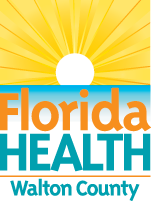WALTON COUNTY WEEKLY BEACH SAMPLING RESULTS ~ No Advisories Issued for This Sampling Period ~
August 11, 2020
Contact:
Crystal Steele
Crystal.Steele@flhealth.gov
850-892-8021
Walton County – The Florida Department of Health in Walton County (DOH-Walton) conducts regularly scheduled saltwater beach water quality monitoring at seven sites through the Healthy Beaches Monitoring Program. Samples are collected from March through the end of October. The water samples are analyzed for enteric bacteria (enterococci) that normally inhabit the intestinal tract of humans and animals, which may cause human disease, infections, or rashes. The presence of enteric bacteria is an indication of fecal pollution, which may come from storm water runoff, pets and wildlife, and human sewage. The purpose of the Healthy Beaches Monitoring Program is to determine whether Florida has significant coastal beach water quality problems and whether future beach monitoring efforts are necessary.
Water quality classifications are based upon United States Environmental Protection Agency’s
(EPA’s) recommended criteria and Florida Healthy Beaches Program Categories:
Good = 0 - 35 Enterococci CFU per 100 ml of marine
Moderate = 36 - 70 Enterococci CFU per 100 ml of marine water
Poor = 71 or greater Enterococci CFU per 100 ml of marine water
If you should have any questions, please contact DOH-Walton at (850) 892-8021 or visit the
Florida Department of Health’s Beach Water Quality website
https://www.floridahealth.gov/environmental-health/beach-water-quality/index.html
About the Florida Department of Health
The department, nationally accredited by the Public Health Accreditation Board, works to
protect, promote and improve the health of all people in Florida through integrated state, county
and community efforts.
Follow us on Facebook, Instagram and Twitter at @HealthyFla. For more information about the
Florida Department of Health please visit www.FloridaHealth.gov.
Crystal Steele
Crystal.Steele@flhealth.gov
850-892-8021
Walton County – The Florida Department of Health in Walton County (DOH-Walton) conducts regularly scheduled saltwater beach water quality monitoring at seven sites through the Healthy Beaches Monitoring Program. Samples are collected from March through the end of October. The water samples are analyzed for enteric bacteria (enterococci) that normally inhabit the intestinal tract of humans and animals, which may cause human disease, infections, or rashes. The presence of enteric bacteria is an indication of fecal pollution, which may come from storm water runoff, pets and wildlife, and human sewage. The purpose of the Healthy Beaches Monitoring Program is to determine whether Florida has significant coastal beach water quality problems and whether future beach monitoring efforts are necessary.
| Site | Name | Enterococci | Water Quality |
| SP-0 | Grady Brown Park | 10 | Good |
| SP-1 | Miramar Beach | 10 | Good |
| SP-3 | Dune Allen Beach | 10 | Good |
| SP-4 | Blue Mountain Beach | 53 | Moderate |
| SP-5 | Grayton Beach | 10 | Good |
| SP-7 | Holly Street Beach | 10 | Good |
| SP-8 | Eastern Lake Beach | 10 | Good |
| SP-9 | Inlet Beach Access | 10 | Good |
Water quality classifications are based upon United States Environmental Protection Agency’s
(EPA’s) recommended criteria and Florida Healthy Beaches Program Categories:
Good = 0 - 35 Enterococci CFU per 100 ml of marine
Moderate = 36 - 70 Enterococci CFU per 100 ml of marine water
Poor = 71 or greater Enterococci CFU per 100 ml of marine water
If you should have any questions, please contact DOH-Walton at (850) 892-8021 or visit the
Florida Department of Health’s Beach Water Quality website
https://www.floridahealth.gov/environmental-health/beach-water-quality/index.html
About the Florida Department of Health
The department, nationally accredited by the Public Health Accreditation Board, works to
protect, promote and improve the health of all people in Florida through integrated state, county
and community efforts.
Follow us on Facebook, Instagram and Twitter at @HealthyFla. For more information about the
Florida Department of Health please visit www.FloridaHealth.gov.





Connect with DOH